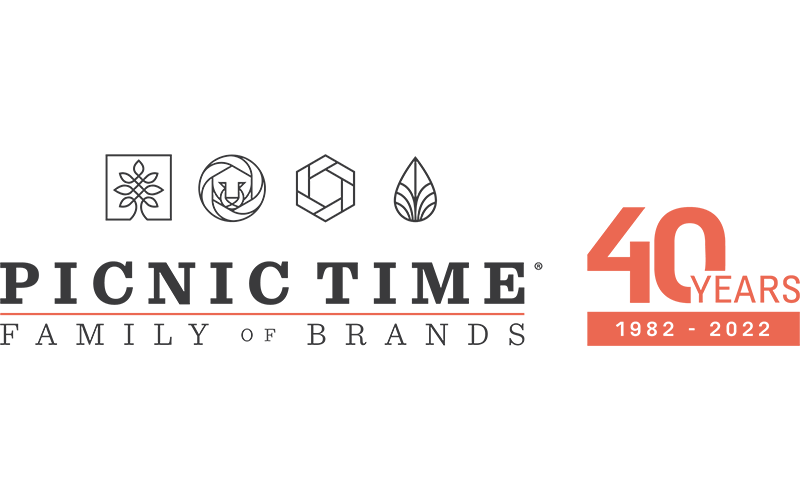Sustainable picnic items inspired to bring loved ones together in nature
Picnic Time Family of Brands has one mission: To create sustainable picnic items that inspire friends and family to come together and make lasting memories. The business creates robust indoor and outdoor entertainment and leisure products designed to last. That is, the brand ditches a throwaway culture, to preserve the natural world humans crave, connect with and seek for our well-being.
Picnic Time has embedded sustainability into the very core of the organization, inspiring a green culture and rallying their green team called Green Beans.
Meeting an unmet market need by providing picnic items
Picnic Time’s story all started in 1975 with founders Gustavo Cosaro and Mario Tagliati. These two gentlemen valued time spent with others, connection, and having a good time – virtues instilled into their business endeavors. This led to them opening their very own wine and cheese store, to provide quality products delivered with a fun and friendly service. Yet, the two soon hit a conundrum. They found they had the perfect items for a picnic, but no one had anything to carry these items in. It was clear that the picnic capital of the world, Southern California, had an unmet market need.
And so Cosaro and Tagliati established a business that created hand-woven picnic baskets. They closed their wine and cheese store to refocus their efforts. Since, the business has grown and matured with the times, selling traditional European-style picnic baskets that everyone can afford.
Moving with the times: Creating sustainable picnic items to safeguard our natural world
Picnic Time’s main goal (besides the universal good of helping to save the planet), is to increase trust with their customers. The team knows that sustainability is a value they share with their stakeholders, so switching to more sustainable resources and making smarter environmental choices whenever and wherever possible made sense for the company.
Obtaining green business certification with the Green Business Bureau showcases the brand’s commitment to sustainability. Such certification means Picnic Time gains the stakeholder trust they deserve and seek, while the team is also guided and supported to drive the organization’s higher purpose. This means checking off key green initiatives, and we’ve highlighted examples of such initiatives the brand has successfully introduced.
Managing waste with sustainable product design and packaging reduction
Picnic Time has worked hard to develop an effective waste management system, one that reduces waste through sustainable product design and packaging reduction.
For one, the brand believes their customers deserve products that last – rather than filling up landfill sites with shobby throwaways. For instance, the brand’s picnic baskets come with reusable utensils to help reduce the need for single-use, disposable plastics. As such, Picnic Time offers and stands by their Built to Last Warranty.
Secondly, the brand packages products with minimal packaging, and the majority of the packaging they do use – for shipping cartons and retail – is recycled cardboard. (Thinking about recycling, the business also has an in-house recycling program for cardboard, plastics, and glass.)
In terms of products, Picnic Time uses sustainable and renewable materials such as RPET, acacia wood, bamboo, parawood, mango wood, vegan leather, and more. Every item is built with care, flaunts quality, and is designed to last.
Creating a green team and culture that nurtures sustainable development
For Picnic Time, sustainability is embedded into the core of the business, which means creating a green culture and rallying employee engagement via their green team.
CEO and Captain Picnic Paul led the charge for Picnic Time’s sustainability program. Yet for Picnic Time it was vital this process didn’t only come down to one person – it had to be a company-wide initiative the entire team was passionate about. This meant making sure everyone on the team felt empowered to take accountability for the organization’s green mission.
To keep the business focused, they founded a green team which they named Green Beans. This team meets regularly to review the overarching sustainability mission, brainstorm methods to achieve goals across departments, and implement actions that will help the business meet these goals.
For Green Beans, no idea is too big or too small to investigate, and thought leadership and communication help this team achieve buy-in across the company on the policies that are implemented.
Installing efficient water and energy management systems
Picnic Time has converted to low water-use landscaping, in addition to introducing water-saving initiatives in the office space. For instance, the business has installed low-flush toilets onsite.
Not only is this brand working to save water, but they’ve also instituted an effective energy management system that embodies initiatives such as:
- Energy-efficient window tinting,
- LED lighting (switching from fluorescent light bulbs),
- Onsite electric vehicle parking complete with EV charging,
- A thorough plan to go fully solar-powered at the brand’s Southern California offices, warehouse, and printing center by 2023.
The challenge of building a sustainable value chain (material sourcing and shipping)
For Picnic Time, the most challenging aspect of their sustainability journey has been the sourcing and shipment of their products. This is a challenge that requires a big commitment and a major eye for detail to come up with sustainable solutions across a complex value chain. This means asking those hard questions, for instance: Perhaps a box is recyclable but is the address sticker recyclable?
Picnic time believes that overall, seeking a sustainable value chain is a worthwhile challenge. The business is truly committed to taking every step of the process into account to achieve their green goals.
Picnic Time operates with strong social and environmental values
Picnic Time is people-forward and design-oriented – and becoming a greener company has helped the brand achieve both of these goals.
The business works hard to make it clear that being a green business increases the quality delivered to the customer at every level. The team believes in making quality, sustainable products that last – meaning no more landfill throwaways. Ultimately business decisions are made with environmental preservation in mind.
In addition, Picnic Time’s fundamental business offering brings people together and encourages people to get out in nature to enjoy good food and company. This is a positive enterprise that values what’s most important in life – memories, relationships, and connection to our natural world.
“At Picnic Time, we’re all about helping people enjoy their leisure time with the people they love most. To us, that means that green initiatives are a natural outgrowth of our core values: to go out and enjoy all our earth has to offer, to ensure those precious resources are available to the next generation, we must make every effort to minimize waste, use sustainable materials, and make smarter environmental choices at every level of our business, from design to manufacturing to shipping.” – Paul Cosaro, Managing Partner at Picnic Time



